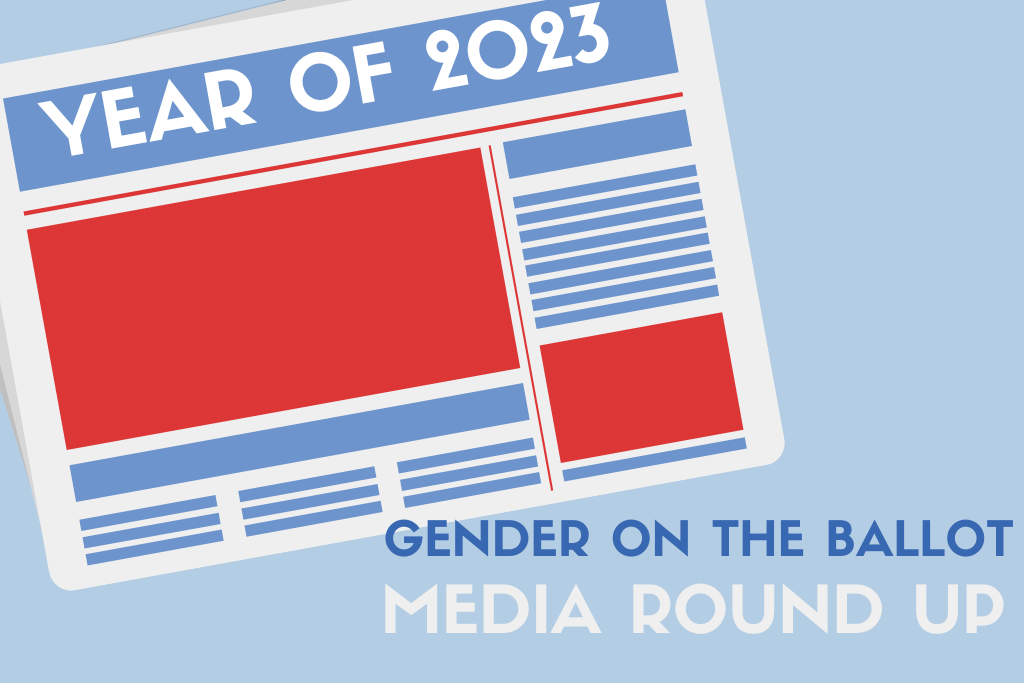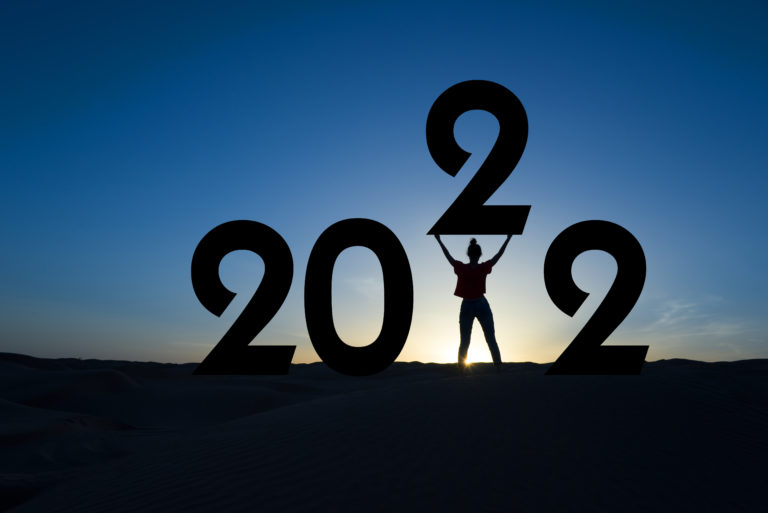From the new records set by women politicians for gubernatorial and congressional seats to…
Top 12 Moments for Women in Politics in 2023

Happy holidays! Welcome to a special edition of our Media Round-Up. Below are the top 12 moments that caught our eye throughout 2023 regarding the intersection of gender and politics.
1. A record-breaking 11 women governors sworn into office
In November 2022, history was made when 12 women were elected to serve as governor of their state, breaking the previous record of 9 set in 2004. Of the 11 women sworn into office in January, many are trailblazing in their own right. Maura Healey of Massachusetts and Tina Kotek of Oregon are the first two openly lesbian governors of their respective states. Maura Healey made history a second time along with Kathy Hochul of New York and Sarah Huckabee Sanders of Arkansas as they all are the first females elected governor of their respective states. Massachusetts and Arkansas made history again by having a female governor and lieutenant governor serving simultaneously for the first time.
2. The Embrace Unveiling, Honoring MLK and Coretta Scott King
On January 13, 2023, “The Embrace” monument dedicated to Dr. Martin Luther King Jr. and Coretta Scott King’s love was unveiled to the Boston Community and the world. The star-studded program included speeches from former Massachusetts Governor Deval Patrick, and the King family, notably King’s 14-year-old granddaughter, Yolanda. “The Embrace” commemorates the moment that Dr. King was informed he won the 1964 Nobel Peace Prize, and his wife Coretta Scott King hugged him. In addition to the sculpture honoring the King’s legacy, it is also meant to signify the overall strength of Black love.
3. Women’s March on 50th Anniversary of Roe v. Wade
In January 2023, people marched nationwide in remembrance of the 50th anniversary of Roe v. Wade. The annual Women’s March began in 2017 in reaction to former President Donald Trump’s election the year prior–this year’s focus was on abortion rights in America. At an event hosted at a Planned Parenthood in Tallahassee, Florida, Vice President Kamala Harris stated, “Let us not be tired or discouraged, [b]ecause we are on the right side of history.” While the marches were seen as a way to energize new activists, they also drew the attention of veterans who were present and fought for abortion rights pre-Roe v. Wade.
4. Women in Hollywood
While the number of women in Hollywood in executive/behind-the-scenes positions is still stark compared to men, women dominated the industry this year. Greta Gerwig’s Barbie was a box-office hit, revitalizing what was a dying movie industry. Taylor Swift and Beyonce starred in two of the highest grossing tours this year, The Eras Tour and Renaissance, respectively. They then took their tours to the box office where they were also hits. Missy Elliot became the first female rapper inducted into the Rock and Roll Hall of Fame, and Queen Latifah became the first female rapper honored by the Kennedy Center. Women also led and negotiated the writer’s and actor’s strikes, effectively ending both after fighting for better pay and benefits for both parties.
5. McClellan sworn in to represent Virginia in Congress
In February 2023, Jennifer McClellan made history when she was elected to fill an open seat in the U.S. House of Representatives, making her the first Black woman to represent Virginia in Congress. Prior to McClellan’s election and inauguration, only 22 states had ever elected a Black woman to congress. After her win, McClellan said that beyond her making history, it meant even more to her due to her family’s history in the Jim Crow South – her mother did not vote until after the Voting Rights Act of 1965. In an interview after her win, McClellan said, “It’s a huge honor, and responsibility, to ensure that I’m not the last.”
6. Supreme Court Strikes Down Affirmative Action
In a historic decision in June of this year, the U.S. Supreme Court effectively ended race-conscious admissions programs at colleges and universities in America. The original reasoning for the policy urged the government to act affirmatively to end race and gender discrimination; however, over time critics have suggested affirmative action leads to racial quotas and preferences that give advantages to people of color and discriminate against white people. The end of affirmative action will have ripple effects on the college admissions process and possibly diversity in hiring, especially for women who heavily benefited from both programs.
7. Historic Elections for Women
Women made history during this year’s elections – especially at the state and local level. In Philadelphia, Cherelle Parker became the first woman and Black woman elected mayor of the city. In Des Moines, Iowa, Connie Boeson was elected the city’s first woman mayor. Lilly Wu became Wichita, Kansas’ first Asian American mayor. Nadia Mohamed was elected St. Lous Park, Minnesota’s first Somali American mayor, and is believed to be the first Somali American elected mayor of any U.S. city on the state level. Danica Roem won her race to become Virginia’s first transgender state Senator and the second-ever in the country.
8. Nikki Haley’s Rise to Prominence
In February, Republican Nikki Haley launched her campaign for president. At first underestimated, Haley has proven she is tough competition as her popularity continues to creep upward in the polls. Leaning on her womanhood, experience as a daughter of immigrants, and political resume, Haley is using her uniqueness to her advantage and it is beginning to work with some voters. The Koch Brothers and Wall Street tycoons endorsements and fundraisers for Nikki Haley are pushing her as an alternative to former President Donald Trump. Although she has a long way to go in the polls before catching up to rivals Governor DeSantis out of Florida and Trump, Haley is proving herself to be a rising star.
9. Laphonza Butler makes history as the first openly lesbian Black woman in the U.S. Senate
After the passing of Senator Dianne Feinstein, California Governor Gavin Newsom appointed former Emily’s List President Laphonza Butler to the vacant U.S. Senate seat. Butler was sworn into the position by Vice President Kamala Harris, her former employer, on Tuesday, October 3, 2023. Butler has made history as the third Black woman to serve in the U.S. Sente, and the first out Black lesbian to enter Congress. Butler is currently the only Black woman serving in the U.S. Senate. Butler does not plan on entering the 2024 race for the Senate seat.
10. Vice President Kamala Harris Makes History
In the last month of the year, Vice President Kamala Harris casted her 32nd tie-breaking vote which set a new record for number of votes casted by a vice president. Acknowledging the history made, Majority Leader Chuck Schumer, “Today is historic. Vice President Harris has just cast her 32nd tie-breaking vote, the most tie-breakers ever. I join all of my colleagues on both sides of the aisle thanking the Vice President for her leadership, and for making the work of the Senate possible.” Schumer then had a brief ceremony in the Senate Reception Room and presented Harris with the “Golden Gavel.”
11. Peggy Flanagan To Chair Democratic Lieutenant Governors Association
Minnesota Lieutenant Governor Peggy Flanagan made history when she was elected chair of the Democratic Lieutenant Governors Association, the first Native American woman to lead a national political party committee. Flanagan is currently the nation’s highest-ranking Native woman elected to office. First elected to the position in 2019, Flanagan has gained notoriety over the years for bringing awareness to the importance of the Lieutenant Governor position. In her acceptance speech, Flanagan said, “This past year, we’ve really showed the country that we can and must dream big. I think that is one of the reasons why my colleagues have elected me into this position. To show what is possible.”
12. In Memoriam: Trailblazing Senator Dianne Feinstein, First Lady Rosalyn Carter, and First Woman Supreme Court Justice Sandra O’Connor Pass Away
This year, the word lost some iconic women in politics. In September, Senator Dianne Feinstein passed away at the age of 90, and after serving in the U.S. Senate just shy of 31 years – the longest-tenured female senator in history. In November, former First Lady Rosalynn Carter passed away at the age of 96, known best for using her platform to speak out about mental health issues during a time where that was not commonplace. On December 1st, former Supreme Court Justice, the first woman to serve on the highest court in the nation, passed away at the age of 93.






